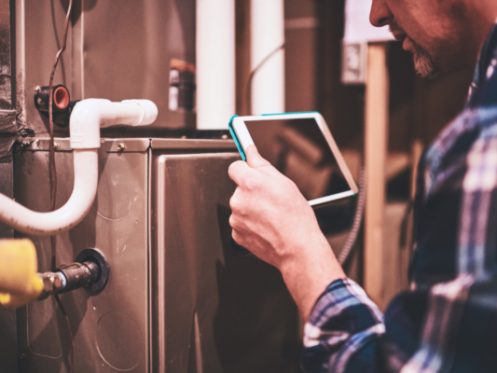Now that the warm weather is fading and winter is quickly approaching, your furnace system is starting to get a lot more use as the temperatures start to drop. Your furnace, just like any other appliance, needs routine maintenance to keep it running smoothly, and older units will eventually break down more often. Combine this with the long stretch of time your furnace has been sitting and collecting dust, and it’s not uncommon to run into a few issues when first starting up your system. One of the warning signs something might be wrong with your system is the smell of gas. If you start to smell gas once your furnace kicks on for the first time this winter season, don’t panic. Here are some things to check to try to find the source of the problem and decide if it’s time to call in the professionals.
How Strong Is the Smell
The natural gas that fuels furnaces is normally odorless, but gas companies are required to mix mercaptan into the gas supply, a sulfur-based chemical. Mercaptan is harmless to both humans and your pets, and while it does have an unsavory smell similar to something like rotten eggs, it isn’t going to cause any health problems. It’s added to help give homeowners and repair personnel a sign there might be a gas leak. Unfortunately, the smell of mercaptan can sometimes be masked by other strong odors or even be absorbed by other substances in some cases, so you can’t always count on the strength of the smell to tell just how bad the situation might be. If there is a lingering odor, though, it can be a sign of a potential leak.
How Long Does the Smell Linger
Since it likely hasn’t been in use for a few months, your furnace has likely gathered a bit of dust over the summer months, both inside and outside the heating system. When the unit kicks in and gas starts flowing again, and as the gas ignites and heats the unit and pipes, all of that dust will start to burn off of your furnace. The dust usually mixes with the mercaptan in the gas being supplied to the furnace, causing that typical gas smell around the unit and sometimes through the vents. If you smell gas when you first turn on the burner, but it dissipates within about a minute and does not return, it was likely just from the burning dust that settled on the heating system. If the smell lingers for a long period of time or returns after a while, it could be a sign you have a gas leak somewhere in your system.
Where Is the Smell
The most common place you might smell gas is near your furnace. There are a few reasons this might be the case. The first is the regular emission of gas as your furnace ignites to keep temperatures consistent. Depending on how cold it is, the furnace may have to ignite two to three times an hour to keep your home warm. As the gas ignites, sometimes you’ll be able to smell the mercaptan when standing close to the furnace. This usually isn’t a problem, as it’s more just the odor escaping as the furnace ignites and then dissipating. This can be a problem if your furnace is short cycling, though, which is when your furnace turns on and off but does not heat a room to the temperature set on the thermostat. If your heating system is short cycling, it is time to call an HVAC professional.
The other reason you might smell gas near the furnace is due to an exhaust issue. You may smell mercaptan, but not to a heavy extent or intermittently while near the furnace. This situation might be a sign that you have some kind of issue with your exhaust system. The exhaust system is meant to dissipate unburnt natural gas away from the house, but sometimes the exhaust system can malfunction, causing some of the gas to linger in the exhaust pipes or even back up a little into the home. While this usually isn’t an emergency so long as the exhaust pipes aren’t completely blocked, it is something that you certainly should have repaired.
Stagnant and Consistent Gas Smell
If the smell of gas lingers for a prolonged period of time or becomes more concentrated with time, it’s a strong possibility you have a gas leak. The first thing you should do is evaluate the risk for combustion. If there is a high risk of combustion, for example, you smell gas in a room that’s not the boiler room, or the smell is a good distance away from the furnace, leave the house immediately. Don’t turn on or off lights, as any change in an electrical circuit might cause a spark that could risk combustion. Leave the house, get a safe distance away and call both emergency services and your gas company. Emergency services will assess the situation and block off the area until the immediate threat is resolved, and your gas company will shut off the gas line to prevent more gas from leaking into the home. Once the immediate danger is dealt with, you should call to have your furnace and heating pipes inspected for leaks and have repairs done.
If the smell is isolated to a small area near your furnace or coming from a specific vent or room, you can turn off the main gas line yourself and open a few windows before making the call for repairs. Your main gas shut-off valve should be near your furnace, feeding in from outside your home. The valve will either be your standard wheel valve which you would turn clockwise to close, or a lever valve which you would turn perpendicular to the pipe to shut off. There’s also the main shut-off valve outside, but those often require a wrench or special tool to close. Once the main valve is turned off, open the door to the room you smelled the gas in and open the windows to start ventilating the house. This will get the gas out so you can safely handle getting the repair process started.
What to Do For Repairs
Once the gas leak no longer poses an immediate threat, give [company name] a call to schedule an appointment. [company name] is women-owned and located in Bountiful, UT. We service the entire region, and our certified professionals will help resolve any furnace issues you might have. We will perform an assessment and give you a reasonable estimate, and get the work done quickly and efficiently to get your home heating system back in working order as soon as possible. We handle heating and cooling system repair, installation, and maintenance. In addition, we provide indoor air quality services and install and maintain fireplaces.
If your heating system needs repair work, or it’s simply time for routine maintenance, don’t hesitate to give [company name] a call today to schedule an appointment.








